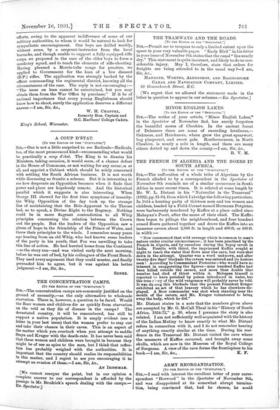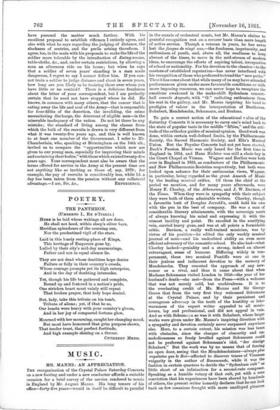ARMY REORGANISATION.
[TO THE EDITOR OF THE "SPECTATOR."] SIR,—I read with interest the excellent letter of your corre- spondent " Horwood " in the Spectator of November 9th, and was disappointed at its somewhat abrupt termina- tion, being convinced that, had he chosen, he could have pursued the matter much further. With his excellent proposal to establish riflemen I entirely agree, and also with what he says regarding the judging of distance, the slackness of sentries, and the perils arising therefrom. I agree, too, in the main with his proposals to make the life of the soldier more tolerable by the introduction of dining-rooms, table-cloths, &c., and, under certain restrictions, by allowing a man an afternoon ride on his horse ; but when he says that a soldier of seven years' standing is a man made dangerous, I regret to say I cannot follow him. If you can- not train a soldier to judge distance and shoot in seven years, how long are you likely to be training those over whom you have little or no control ? There is a delicious frankness about the letter of your correspondent, but I am perfectly certain that he need not have stopped where he did. He knows, in common with many others, that the cancer that is eating away the life and soul of the Army—that is responsible for four-fifths of the desertion, the invaliding, the crime necessitating discharge, the deterrent of eligible men—is the miserable inadequacy of the ration. Do not let there be any mistake ; the standard of living among the classes from which the bulk of the recruits is drawn is very different from what it was twenty-five years ago, and this is well known to at least one member of the Government. I refer to Mr. Chamberlain, who, speaking at Birmingham on the 14th ult., invited us to compare the " opportunities which now are given to our young men, especially for improving their minds and sustaining their bodies," with those which existed twenty-five years ago. Your correspondent must also be aware that the terms offered for service in the Army at the present time are not anything like so inviting as those of, say, 1879 ; for example, the pay of recruits is considerably less, while ld. a day has been taken from the pension without any collateral



























































 Previous page
Previous page